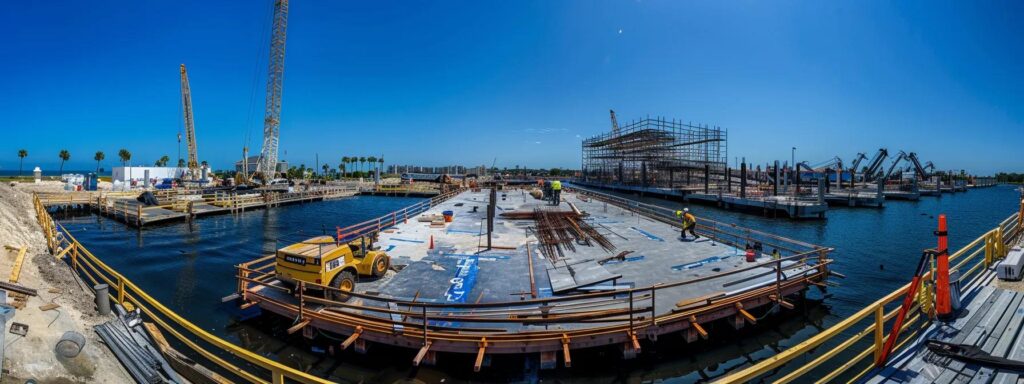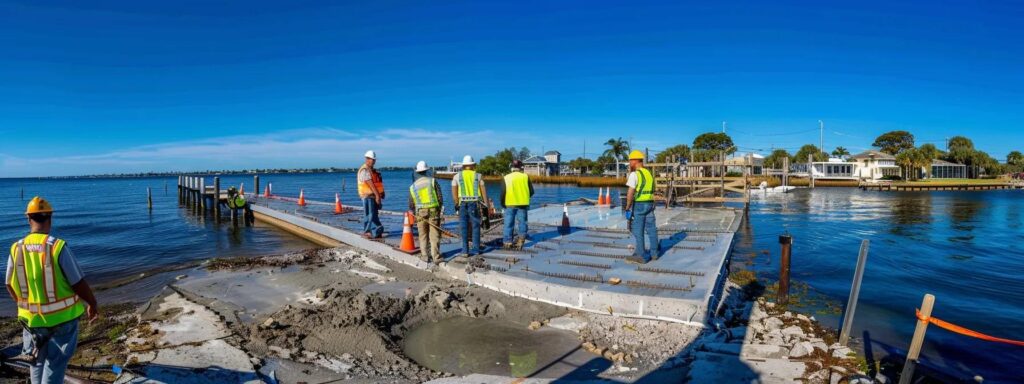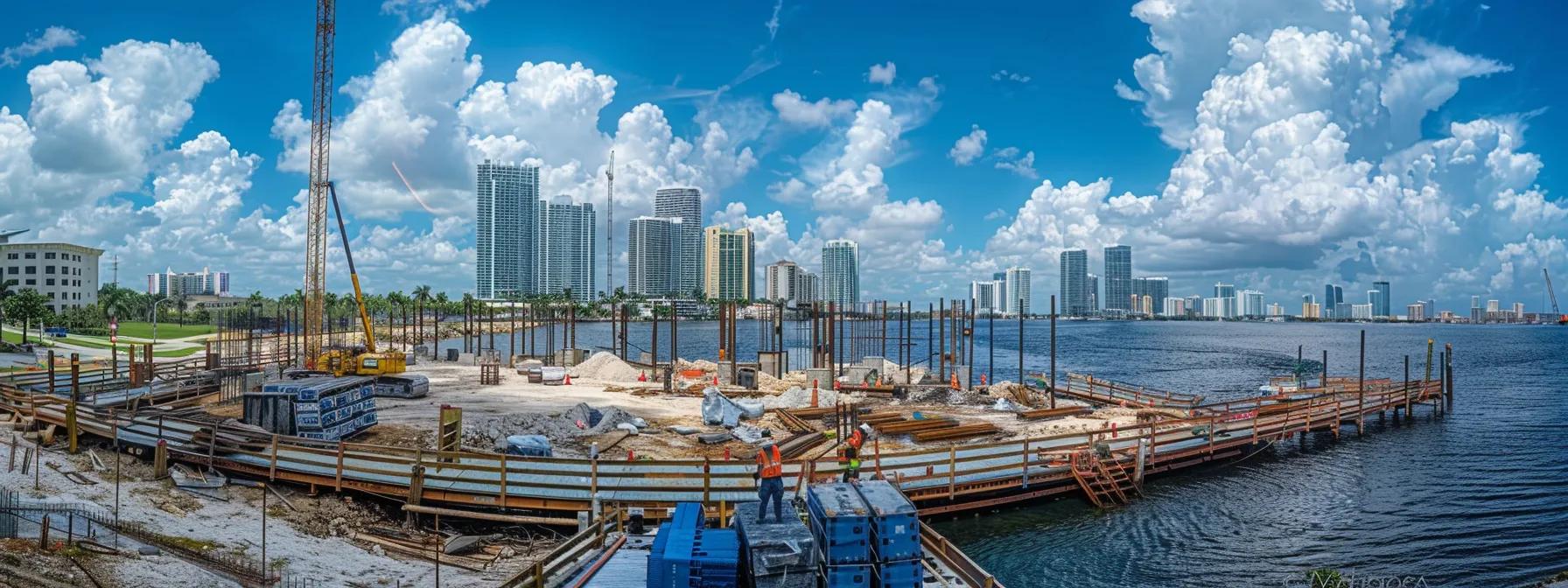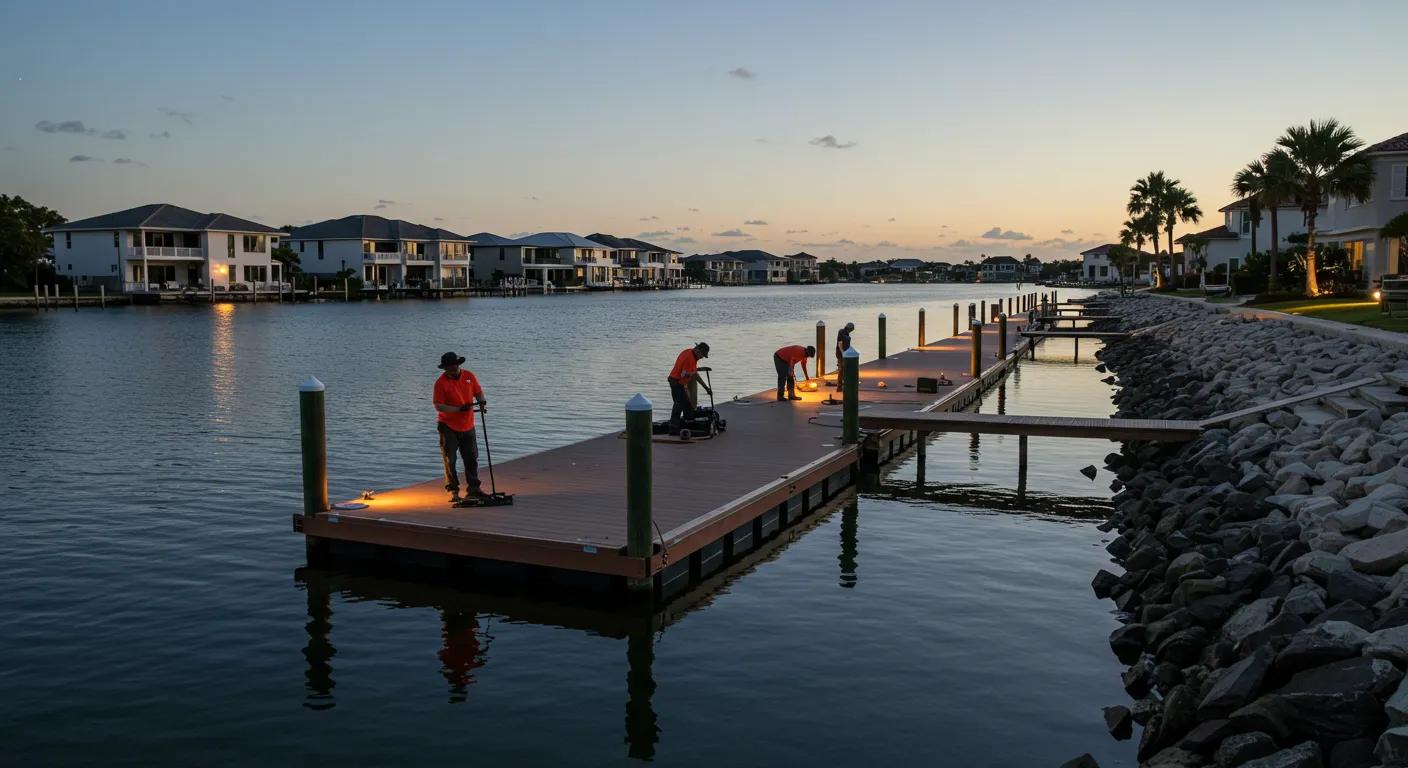Essential Safety Standards for Dock Construction
In constructing a dock, ensuring safety from design through long‐term maintenance is crucial. You must address multiple factors—from local codes and environmental compliance to the selection of durable materials and risk‐mitigation procedures. This article clarifies safety regulations, material choices, construction procedures, structural considerations, contractor qualifications, and maintenance plans to protect your investment and ensure compliance with occupational safety and health requirements. Whether constructing a residential dock for waterfront enjoyment or a commercial dock for cargo loading, these comprehensive guidelines help protect lives, prevent environmental degradation, and enhance longevity.
Let’s explore each key area of dock construction safety in detail.
Understand Key Safety Regulations for Dock Construction
The first step in building a secure dock is implementing proper safety regulations. You must follow both local and federal codes along with industry best practices and environmental standards. Local policies often define dock dimensions, access, and load-bearing limits essential for maritime law and natural resource protection, helping you avoid violations and fines.
Review local codes regarding waterfront access, required distances from navigational channels, buoy placements, and material-specific regulations (e.g., treated wood versus composite). Note that temporary structures may be subject to additional safety protocols.
Federal guidelines from entities such as the Army Corps of Engineers or OSHA set standards for worker safety. These guidelines cover safety training, personal protective equipment, and hazardous material certifications, which help ensure compliance and legal protection.
Best practices found in trade publications or expert case studies emphasize proper load distribution using engineering software, fall protection measures, emergency protocols (including fire suppression and evacuation routes), and regular safety audits. Environmental compliance is also key. Regulations on foam, metal usage, and water pollution help protect marine habitats and maintain natural aesthetics. Regular updates to safety protocols and material certifications further ensure your dock meets all necessary requirements.
Choose the Right Materials for Durable Dock Construction

Selecting the proper materials is pivotal to withstand harsh marine environments. You must evaluate materials based on water conditions, environmental impacts, and maintenance requirements while ensuring they meet rigorous safety and environmental standards.
For saltwater exposure, use corrosion-resistant metals or naturally resistant composites; for freshwater, pressure-treated wood or recycled plastic composites can be effective. Verify that materials meet certifications from bodies like the Coast Guard or local safety administrators.
Assess each material’s lifecycle impact on water quality, natural resource usage, and pollution. For example, composite materials often reduce the need for toxic chemical treatments compared to traditional wood. Consider materials with proven durability and low maintenance:
- Pressure-treated lumber – Demonstrated resistance to water damage.
- Recycled plastic composite – Environmentally sustainable and virtually maintenance-free.
- Aluminum – Lightweight, corrosion-resistant, and durable.
- Steel – Offers high strength but requires protective coatings in marine conditions.
- Concrete – Long-lasting and configurable for high load-bearing needs.
While composites may have higher upfront costs, they typically offer longer lifespans and reduced maintenance expenses. In contrast, traditional wood may require more frequent treatments. Comparative evaluations—such as aluminum docks showing up to 50% lower maintenance costs over 20 years—inform your material choice. Ensure all components, from wood preservatives to metal coatings, receive independent certification (e.g., ISO or ASTM) to enhance safety and lower liability.
Implement Safety Procedures During Dock Construction
Safety procedures during construction are essential for protecting your team and ensuring a successful project. Develop a comprehensive safety plan that includes proper safety training, regular audits, and clear emergency protocols so every crew member is equipped with the necessary tools and protective gear.
Begin by identifying hazards such as falls, moving forklifts, or heavy machinery risks. Outline preventive steps including periodic risk assessments and strict use of PPE as mandated by OSHA. This systematic plan should include checkpoint reviews and readily available emergency contacts.
Regular safety training – covering fall protection, safe tool use, and emergency response – can significantly reduce accident rates. Moreover, conducting frequent safety audits (including site inspections, equipment checks, and credential reviews) ensures ongoing compliance and allows for timely corrections. Establish emergency protocols, such as communication systems and designated assembly points, to handle incidents like floods or gas leaks. Finally, ongoing monitoring of safety equipment ensures that machinery, scaffolding, and fall protection systems always comply with the latest standards.
Prioritize Structural Integrity in Dock Design
Ensuring your dock’s structural integrity means designing it to withstand environmental and load-induced stresses. Use engineering principles to analyze load-bearing capacities and choose the appropriate foundation based on local soil conditions and water levels.
Employ engineering software and real-life tests to simulate stresses from static loads (the dock’s own weight) and dynamic loads (traffic from vehicles and pedestrians). Proper load analysis can reduce failure risks significantly.
Choose a foundation that suits the local soil; for example, deep pile systems work well in soft or waterlogged soils by distributing loads efficiently. Consider the impact of varying water levels when designing the dock—floating docks, for instance, can adjust to tides and storm surges. Use simulations to model scenarios such as tidal changes and storm events, ensuring that beams, supports, and cables are adequately dimensioned.
Regular post-construction inspections also help spot wear early, while retrofitting older docks with modern safety features (like additional supports or updated materials) can extend their lifespan and maintain compliance with current safety standards.
Engage Professionals for Quality Dock Construction
Hiring qualified professionals is critical to meeting rigorous safety, quality, and compliance standards. Identify experienced contractors by checking recommendations, trade association memberships, and portfolios of successful dock projects that adhere to local safety regulations.
Verify that contractors hold proper licensing, OSHA safety training certifications, and bonding records. Documentation of past projects and client testimonials further confirms a contractor’s reliability. Detailed quotes should clearly outline the project scope, safety specifications, timelines, warranties, and contingency plans.
Establishing strong communication through regular meetings, progress reports, and on-site inspections ensures that any safety issues or design modifications are quickly addressed. This proactive partnership not only solidifies project outcomes but also minimizes risks and maximizes performance through expert oversight.
Evaluate Long-Term Dock Maintenance and Safety
A detailed maintenance plan is essential to preserve structural integrity and ensure ongoing safety. Schedule regular inspections, cleaning, and repairs, and document maintenance activities meticulously for regulatory compliance and insurance purposes.
Establish time intervals for inspections and clearly define which components require testing. Regular visual inspections and non-destructive testing (like ultrasonic or thermal imaging) can reveal early signs of corrosion or wear. Promptly address weather-related damage by having an emergency repair system in place, especially after heavy rains or storms.
Select environmentally friendly cleaning agents that remove pollutants without damaging materials, and train dock users on safe practices. This training should cover proper weight limits, cleaning procedures, and navigation of slippery surfaces to prevent accidents. Detailed records of inspections and repairs not only assist in risk management but also provide evidence of due diligence during safety audits.
By consistently following a proactive maintenance schedule, you can ensure that your dock remains a reliable, safe platform for both recreational and commercial use.
Final Thoughts
Strict adherence to comprehensive safety standards in dock construction is essential for protecting lives, the environment, and your financial investment. Integrate regulatory compliance, choose durable materials, implement rigorous safety procedures, and engage qualified professionals throughout the project lifecycle. These measures enhance structural integrity, safety, and long-term performance. Consistent application of these practices ensures your dock remains a safe, sustainable, and efficient asset.
Frequently Asked Questions
Q: What are the key safetyregulations for dockconstruction? A: Key safety regulations include compliance with local and federal codes such as OSHA standards, local municipal guidelines, and environmental protection laws. They cover load-bearing capacities, material certifications, safety equipment usage, and environmental compliance to ensure dock safety.
Q: How do I choose the right materials for dockconstruction? A: Choose materials based on water conditions, environmental impacts, maintenance requirements, and durability. Options include pressure-treated wood, composites, aluminum, and steel—each with specific certifications ensuring a balance of cost, safety, and longevity.
Q: What safetyprocedures should be implemented during dockconstruction? A: Develop a comprehensive safety plan that includes hazard identification, PPE usage, regular training sessions, safety audits, and clear emergency protocols. These steps help prevent workplace accidents and ensure construction quality.
Q: Why is it important to engage professionals during dockconstruction? A: Professionals ensure that all aspects of construction—from design and material selection to installation and maintenance—comply with safety standards. Their expertise reduces risks and improves project outcomes through proven quality control measures.
Q: How can I ensure long-term safetyand maintenance for my dock? A: Establish a detailed maintenance schedule with regular inspections and prompt repairs. Documenting all activities and training users on safe practices further secures the dock’s integrity and compliance with safety regulations.
Q: What should I look for in a contractor for dockconstruction? A: Look for contractors with experience in marine construction, proper licensing, positive testimonials, comprehensive project quotes, and clear warranties. Effective communication is also crucial to ensure a reliable and safe construction process.
Q: Does material selection impact the overall safetyof dockconstruction? A: Yes, material selection is critical. Using certified, durable materials suited to local water conditions minimizes maintenance and structural failure risks, ensuring the dock remains safe and long-lasting.




